Wilkes NSG
Wilkes University
All 21 results
Sort by
WILKES UNIVERSITY NURSING BUNDLED EXAMS 2023/24|ALL GRADED A+|DOWNLOAD TO PASS
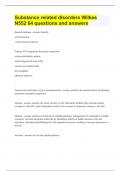
-
Substance related disorders Wilkes N552 |64 questions and answers
- Exam (elaborations) • 25 pages • 2023
-
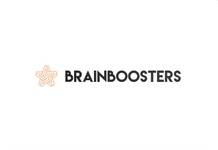 BRAINBOOSTERS
BRAINBOOSTERS
-
- $14.99
- + learn more
Reward pathway Genetic, environmental, cultural factors interact Primary NT is dopamine Key areas: dopamine mesocorticolimbic system, ventral tegmental area (VTA), nucleus accumbens (NA), the amygdala, olfactory tubercle. , Cocaine and stimulants, such as amphetamines activate the reward system by blocking dopamine reuptake transporter. Opioids activate the same circuitry as the stimulants (initially they activate opioid receptors in the VTA, which ultimately results ...
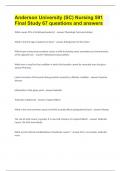
-
Anderson University (SC) Nursing |591 Final Study 67 questions and answers
- Exam (elaborations) • 7 pages • 2023
-
 BRAINBOOSTERS
BRAINBOOSTERS
-
- $14.49
- + learn more
What causes 95% of all delayed puberty? Physiologic hormonal delays What is the first sign of puberty in boys? Enlargement of the testes Which type of precocious puberty causes a child to develop some secondary sex characteristics of the opposite sex. Mixed precocious puberty What term is used for the condition in which the foreskin cannot be retracted over the glans Phimosis Lateral curvature of the penis during erection caused by a fibrotic condition Peyronie d...
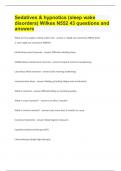
-
Sedatives & hypnotics (sleep wake disorders) Wilkes N552| 43 questions and answers
- Exam (elaborations) • 11 pages • 2023
- Available in package deal
-
 BRAINBOOSTERS
BRAINBOOSTERS
-
- $13.49
- + learn more
What are two stages of sleep-wake cycle 1. Rapid eye movement (REM) sleep 2. Non-rapid eye movement (NREM) Initial/sleep-onset Insomnia Difficulty initiating sleep Middle/sleep maintenance insomnia Frequent nocturnal awakenings Late/sleep offset insomnia Early morning awakenings nonrestorative sleep Waking up feeling fatigue and unrefreshed What is insomnia difficulty falling or remaining asleep What is acute insomnia? Less than 3 months W...
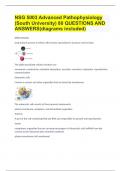
-
NSG 5003 Advanced Pathophysiology (South University) |80 QUESTIONS AND ANSWERS
- Exam (elaborations) • 12 pages • 2023
- Available in package deal
-
 BRAINBOOSTERS
BRAINBOOSTERS
-
- $13.99
- + learn more
Differentiation (maturation) process in which cells become specialized in structure and function The eight specialized cellular functions are movement, conductivity, metabolic absorption, secretion, excretion, respiration, reproduction, communication Eukaryotic cells Contain a nucleus and other organelles that are bound by membranes. The eukaryotic cell consists of three general components plasma membrane, cytoplasm, and intracellular organelles Nucleus A part of the cel...
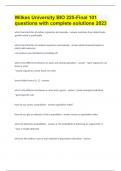
-
Wilkes University BIO 225-Final |101 questions with complete solutions 2023.
- Exam (elaborations) • 11 pages • 2023
- Available in package deal
-
 BRAINBOOSTERS
BRAINBOOSTERS
-
- $15.99
- + learn more
what characteristics of unitary organisms and example ourselves-have determinate growth which is predictable what characteristics of modular organisms and example plants/leaves(strawberry plant)-add molecules can produce new individuals by budding off what is the difference between an open and closed population *open-organisms can leave or enter *closed-organisms cannot leave nor enter know bolded terms ch. 12 what is the difference between a ramet and a genet *...
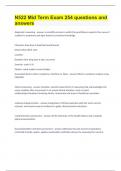
-
N522 Mid Term Exam| 254 questions and answers.
- Exam (elaborations) • 34 pages • 2023
- Available in package deal
-
 BRAINBOOSTERS
BRAINBOOSTERS
-
- $17.49
- + learn more
diagnostic reasoning a scientific process in which the practitioner suspects the cause of a patient's symptoms and signs based on previous knowledge Character-how does it look/feel/smell/sound Onset-when did it start Location Duration-how long does it last, recurrent Severity- scale 0-10 Pattern- what makes it worse/better Associated factors-other symptoms, interfere w/ ADLs What is symptom analysis using COLDSPA clinical reasoning situation, practice-based form of reason...
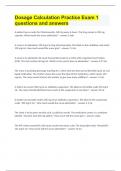
-
Dosage Calculation Practice Exam 1 questions and answers.
- Exam (elaborations) • 3 pages • 2023
- Available in package deal
-
 BRAINBOOSTERS
BRAINBOOSTERS
-
- $16.99
- + learn more
A patient has an order for Chloromycetin, 500 mg every 6 hours. The drug comes in 250 mg capsules. What would the nurse administer? 2 tabs A nurse is to administer 150 mg of a drug intramuscularly. The label on the multidose vials reads 100 mg/mL. How much would the nurse give? 1.5 mL A nurse is to administer 30 mg of furosemide (Lasix) to a client with congestive heart failure (CHF). The vial contains 40 mg/mL. Which is the correct dose to administer? 0.75 mL The nurse i...
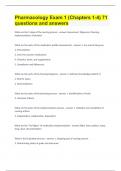
-
Pharmacology Exam 1 (Chapters 1-4) |71 questions and answers
- Exam (elaborations) • 8 pages • 2023
- Available in package deal
-
 BRAINBOOSTERS
BRAINBOOSTERS
-
- $14.49
- + learn more
What are the 5 steps of the nursing process Assessment, Diagnosis, Planning, Implementation, Evaluation What are the parts of the medication profile (assessment) 1. Any and all drug use 2. Prescriptions 3. Over the counter medications 4. Vitamins, herbs, and supplements 5. Compliance and Adherence What are the parts of the Nursing Diagnosis 1. Deficient knowledge (patient's) 2. Risk for injury 3. Noncompliance What are the parts of the planning process 1. Identifi...
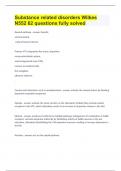
-
Substance related disorders Wilkes N552| 62 questions fully solved.
- Exam (elaborations) • 25 pages • 2023
- Available in package deal
-
 BRAINBOOSTERS
BRAINBOOSTERS
-
- $14.49
- + learn more
Reward pathway Genetic, environmental, cultural factors interact Primary NT is dopamine Key areas: dopamine mesocorticolimbic system, ventral tegmental area (VTA), nucleus accumbens (NA), the amygdala, olfactory tubercle. , Cocaine and stimulants, such as amphetamines activate the reward system by blocking dopamine reuptake transporter. Opioids activate the same circuitry as the stimulants (initially they activate opioid receptors in the VTA, which ultimately results ...

Study stress? For sellers on Stuvia, these are actually golden times. KA-CHING! Earn from your study resources too and start uploading now. Discover all about earning on Stuvia


